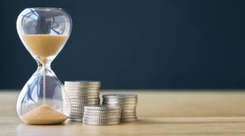Economic crises are unpredictable and can affect anyone. That is why it is important to be prepared to face them and protect our savings. In this article we will provide some tips to face a possible economic crisis and safeguard our personal finances.
What is an economic crisis and how does it affect your savings?
An economic crisis is a period of time in which the economy of a country or region experiences a significant contraction. This can happen for various reasons, such as a recession, an increase in the inflation rate, a drop in real estate prices, among others.
Economic downturns can have significant effects on your savings. During an economic downturn, it is common for interest rates to fall and stock prices to decline. This means that if you have savings invested in the stock market, you may see a significant decrease in their value.
In addition, during an economic downturn, many companies may experience financial difficulties and massive layoffs. If you lose your job or your income decreases dramatically, it may be difficult to continue saving money.
It is important to keep these risks in mind when planning to manage your personal finances during an economic downturn. By taking preventative measures to protect your savings and prepare for difficult situations, you can ensure that you are well prepared for any financial eventuality.
1. Evaluate your current financial situation
Before taking any steps to protect your savings in an economic crisis, you need to assess your current financial situation. This will allow you to have a clear view of your income, expenses, debts and savings.
To evaluate your financial situation, it is recommended that you make a detailed budget. Record all your monthly income and expenses, including fixed expenses such as rent or mortgage, basic utilities such as electricity, water and gas, food and other variable expenses such as entertainment or shopping.
By evaluating your current financial situation, you will be able to identify possible savings opportunities, reduce unnecessary expenses and establish a payment plan for your debts. In addition, you will also be able to determine how much money you have available to protect your savings in case of an economic crisis.
2. Create a realistic budget
One of the best ways to prepare for a financial crisis is to have a realistic budget on which you can base your daily, weekly and monthly expenses.
To create a realistic budget, you need to take into account your current income and expenses. Make a list of all your monthly income and another list for expenses. Consider fixed expenses, such as rent or mortgage, utilities, insurance and debt payments. Then set a limit for variable expenses, such as food, entertainment and non-essential purchases.
Once you've created your realistic budget, be sure to stick to it. If you're having trouble sticking to your budget, look for ways to reduce your expenses or increase your income. You can cut unnecessary expenses, such as a streaming TV service or gym membership. You can also consider looking for additional work or generating additional income through online sales or freelance activities.
Remember that maintaining a realistic budget will not only help you prepare for a financial crisis but also help you achieve your long-term financial goals.
3. Reduce your unnecessary expenses
In times of economic crisis, it is essential to analyze your budget and reduce all unnecessary expenses. You can start by reviewing your subscriptions to services you are not using, such as streaming platforms or magazines.
It is also important to make smarter purchases and avoid impulse spending. Plan your purchases in advance and compare prices in different stores before making any purchase.
Also, consider making lifestyle changes to save money. For example, you can reduce your electricity consumption or reduce your car use to save on fuel.
Reducing your unnecessary expenses may be difficult at first, but in the long run it will help you protect your savings and maintain greater financial stability.
4. Save and invest wisely
One of the best ways to prepare for an economic crisis is to save and invest wisely. If you don't already have an emergency reserve, it's important to start building one as soon as possible. This reserve should be enough to cover at least six months of basic expenses, such as rent or mortgage, utilities and food.
Once you have your emergency reserve, you can start investing your savings in different options, such as stocks, bonds or mutual funds. It is important to talk to a financial advisor before making any investment decisions to make sure you are making the best choice for your financial profile and goals.
It is also advisable to diversify your investments in different sectors and geographic regions to reduce risk and maximize long-term returns.
5. Diversify your investments
An important way to protect your savings is to diversify your investments. This means not putting all your eggs in one basket. Instead of investing in a single company or sector, it is advisable to invest in different options, including stocks, bonds, real estate and precious metals.
It is also important to diversify within each investment option. For example, if you decide to invest in stocks, don't put all your money in one company. Look for different companies and sectors to spread your investment across.
Diversification will help you minimize the risk of significant losses in case a single sector or company has problems.
Remember to always do thorough research before making investment decisions and consider working with a certified financial advisor to help you make informed decisions.
6. Avoid unnecessary debt
In times of economic crisis, one of the worst situations is to be in debt with monthly payments you can't afford. Therefore, it is important to avoid unnecessary debts and only acquire those that are really important and that you can handle.
Before taking any loan or acquiring a credit card, make sure you understand the terms and conditions and the interest you will have to pay. If you have doubts, seek financial advice to make the best decision.
Remember that many times the solution to an economic crisis is to have more income and spend less, so consider alternatives such as looking for a second job or reducing your monthly expenses to avoid the temptation of acquiring unnecessary debt.
7. Learn about personal finance and the economy in general.
It is important to understand the basics of personal finance and economics to make informed decisions about how to manage your money. Invest time in reading books and articles, listening to podcasts and following financial experts who can help you better understand how financial markets work and how to make smart financial decisions.
It's also helpful to learn about the different types of investments available, such as stocks, bonds and real estate, and how they can affect your portfolio. Understanding key concepts such as interest rate, risk and diversification can also help you make more informed decisions about how to invest your money.
Overall, educating yourself about personal finance and the economy can make a big difference in how you manage your money and protect your savings in times of economic crisis.
8. Stay calm and keep a long-term perspective.
Staying calm is key in times of economic crisis. It is important not to panic and make rash decisions. Instead, keep a long-term perspective and think about how you can protect your savings over time.
A good strategy is to diversify your investments and not put all your eggs in one basket. In addition, it is important to review your investments regularly and adjust them according to the current economic climate.
Also remember that economic downturns do not last forever and that the economy will eventually recover. There are always opportunities to invest in times of crisis, so stay calm and follow a long-term strategy to protect your savings.
Conclusion
In summary, preparing for an economic crisis involves being prudent with our personal finances, establishing an emergency fund and diversifying our investments. It is also important to be informed about the current situation of the country and to have a plan of action in case of an economic recession.
Protecting our savings in times of crisis can be difficult, but if we follow these preventive measures we can lessen the impact on our personal finances and manage to stay afloat.
Let's not wait until it is too late, let's start preparing for an economic crisis today!











